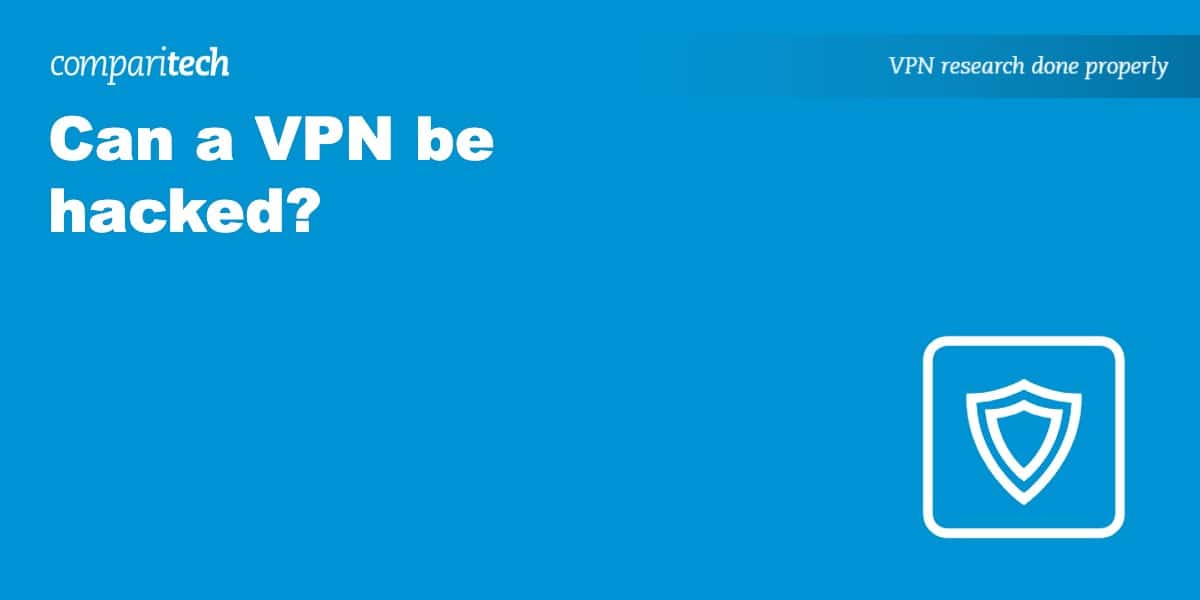When you use a Virtual Private Network (VPN) service, it creates an encrypted tunnel between your device and the VPN server. All of your internet traffic that travels through this tunnel is protected from hackers and snoopers, preventing them from seeing data, including your IP address and browsing activity. Yet this still requires a degree of trust that the VPN provider is properly encrypting your traffic and taking the necessary measures to safeguard your data.
In this post, we’ll explore how a VPN can be hacked, the risks involved, and the steps you should take in such an event.
Can a VPN be hacked?
The fact is that a VPN can be hacked, but provided it uses a strong VPN protocol with a high level of encryption, this is highly unlikely. The best VPNs on the market use trusted, open-source VPN protocols such as OpenVPN and WireGuard. This combined with 256-bit AES or ChaCha20 encryption makes it extremely difficult for attackers to decrypt data, making a hack all the more unlikely as a result.
There are a few ways in which a VPN could be hacked, albeit not easily done, particularly if the VPN has a high level of security. Here are how this could happen:
- Vulnerability in VPN software
- Poor encryption standards
- Man-in-the-middle (MitM) attack
- DNS hijacking
- IP leaks
- Server seizure
Before we discuss these risks in greater detail, let’s first examine how a VPN works. When you connect to a VPN, all of your internet traffic travels through the VPN’s encrypted tunnel to and from the VPN server. An attacker would need to steal the encryption key or perform a brute-force attack to decrypt this data.
Data is more vulnerable to hacking attempts when not traveling within the VPN tunnel. This is when the VPN server receives the data, decrypts it, and sends it to the website or service you’re trying to access (and the same is true when the website sends the requested information back to the VPN server).
How can a VPN be hacked?
Hacking a VPN isn’t easy and requires a great deal of effort and expertise. A VPN’s security depends on a variety of factors, including the VPN protocols it uses, its encryption standards, and its security practices. Here are some of how a VPN could be compromised in a hack:
Vulnerability in VPN software
As with any software, VPN software can have vulnerabilities. These issues can come from the VPN software itself (either from the client end or the server side) or from a flaw in the VPN protocol. Vulnerabilities can range from minor issues that have a negligible impact on you as a user to severe flaws that could compromise your data security and privacy.
Among the various VPN protocols, OpenVPN and WireGuard stand out for their strong security features. However, older protocols like PPTP are known to be more vulnerable to attacks. The evolving nature of cyber threats makes it vital for VPN providers to regularly update and patch their software to guard against new vulnerabilities. You also play a role as a user by ensuring that your VPN software is always up to date.
Poor encryption standard
Encryption turns readable data into an encoded format that can only be deciphered with a specific key. A VPN encrypts the data sent between your device and the VPN server, ensuring that even if it’s intercepted, it remains unreadable to unauthorized parties. Needless to say, this is essential for protecting data such as personal information, financial details, and private communications.
A VPN should use strong encryption. Failing to do so, be it through outdated encryption algorithms or insufficient key length, leaves data vulnerable to decryption. Reputable VPN providers employ strong encryption algorithms like AES-256 and use keys of sufficient length to resist brute-force attacks.
DNS hijacking
DNS hijacking sees an attacker reroute DNS requests (the system that translates domain names into IP addresses) from their intended destination to a malicious server controlled by them. For VPN users, even if internet traffic is encrypted, DNS requests could still be exposed if they’re not securely routed through the VPN’s tunnel.
Upon intercepting the DNS requests, attackers can redirect users to fraudulent websites that are made to appear legitimate, potentially leading to data theft. It’s for this reason that you should only use a VPN that has DNS leak protection by routing all DNS queries through its secure, encrypted tunnel. This ensures they’re hidden from hackers and snoopers alike. Many VPNs use their own DNS servers and employ encrypted DNS protocols to further secure queries.
IP leaks
IP leaks occur when your real IP address is accidentally exposed to websites or services you visit while connected to the VPN. Needless to say, this undermines the privacy the VPN is supposed to provide. Leaks may happen due to software flaws, misconfigured network settings, or when IPv6 traffic isn’t properly secured by the VPN.
A VPN should offer a kill switch feature that automatically cuts internet traffic if the VPN connection fails. This prevents any data from being sent over the unsecured connection. Furthermore, VPNs can enforce IPv6 leak protection by blocking IPv6 traffic or routing it through the VPN tunnel.
Credential theft
When a VPN’s credentials are stolen, attackers can access the VPN and intercept or manipulate sensitive data. However, the danger is limited if the VPN employs perfect forward secrecy. It means that each session uses a unique encryption key. Even if an attacker obtained a session’s keys, they can’t decrypt past or future sessions.
Hackers might also steal or purchase VPN login passwords to access a system.
Port forwarding
Port forwarding allows you to remotely connect to devices on a private network and speeds up torrenting. It works by redirecting communication requests from one address and port number to another while the packets are passing through a gateway such as a router or firewall. However, if port forwarding isn’t properly configured, it could give hackers access to your device.
Split tunneling
With split tunneling, you can choose which specific internet traffic is routed through the VPN connection and which traffic bypasses it, connecting directly to the internet. This feature has risks if not implemented properly. An attacker might exploit the unencrypted, non-VPN traffic to gain access to a device. While this does not directly compromise the VPN tunnel, it could potentially allow an attacker to use compromised devices to reach sensitive information.
Server seizure
Whether through legal means or illegal actions, server seizures are a significant risk and may see authorities or malicious actors gain physical control over VPN servers. This could lead to the exposure of user data, particularly if the VPN provider hasn’t taken adequate precautions. VPN providers employ a number of security measures in order to safeguard against hacking risks associated with the seizure of servers.
In particular, a VPN should operate a no-logs policy ensuring that, even if a server is seized, there’s no user activity or connection data to be found. Additionally, it’s increasingly common for VPNs to use diskless (RAM-only) servers where all information is stored on volatile memory that’s cleared upon server restart. Choosing a VPN that operates in a country with strong privacy laws such as Switzerland further reduces risk.
VPN hacks and vulnerabilities
So we now know some of how a VPN can be hacked. Here are a few more specific examples of VPN hacks and the vulnerabilities they targeted:
Fortinet
In 2020, attackers exploited a path traversal vulnerability (CVE-2018-13379) in Fortinet’s FortiOS SSL VPN. The vulnerability allowed attackers to download system files through specially crafted HTTP resource requests. Thousands of usernames and passwords tied to Fortinet VPNs were leaked and posted online.
NordVPN
NordVPN suffered a 2018 security breach that only became public knowledge in 2019. An insecure remote management system of a data center provider led to unauthorized access to one of NordVPN’s servers. Fortunately, it didn’t impact any other NordVPN servers or data. The attacker acquired an expired TLS key which could theoretically have been used to perform a man-in-the-middle attack (MITM) attack on a single user.
Pulse Secure
Multiple vulnerabilities in Pulse Secure VPN appliances were exploited by attackers in 2019 and again in 2021. These included CVE-2019-11510, which allowed for arbitrary file reading, and CVE-2021-22893, a buffer overflow vulnerability.
These flaws allowed attackers to execute arbitrary code and maintain continued access to the affected systems. Due to the serious nature of the vulnerabilities, the Cybersecurity and Infrastructure Security Agency (CISA) issued alerts and advice to mitigate them.
What happens if a VPN is hacked?
When a VPN is hacked or compromised in some way, the consequences vary depending on the nature of the vulnerability exploited. The hacker’s intentions are another influencing factor. Here are some of the potential consequences:
- Loss of privacy: A VPN should of course protect your privacy by encrypting your data and hiding your IP address. However, a hack could expose your IP address and even your browsing activity.
- Data theft: If an attack allows for the interception of your data, sensitive information such as passwords, financial details, and personal communications could be stolen.
- Man-in-the-Middle Attacks: A more sophisticated attacker could place themselves between the user and the VPN server, allowing them to intercept, redirect, or even modify data.
- Account compromise: If login credentials for the VPN itself are stolen, attackers could gain unauthorized access to your account. This would allow them to spy on your activity or impersonate you.
- Malware and phishing: In the event that VPN software is compromised, it could be used to deliver malware or phishing attacks which would lead to even further security issues.
What to do if your VPN is hacked
If you suspect that your VPN has been hacked, you must take immediate action to secure your data and prevent damage. Here’s what you need to do:
- Start by disconnecting from your VPN to prevent further data exposure.
- Change your VPN account password, and the passwords for any other accounts you suspect may be compromised. Be sure to make strong, unique passwords.
- Enable multi-factor authentication (MFA) so that your accounts have an extra layer of security.
- Check that your VPN client is up-to-date. Install any updates or patches that might address security vulnerabilities.
- Look for any unusual activity or settings changes in your VPN account. This includes new or unrecognized devices or unfamiliar IP addresses.
- Perform a full scan of your devices using a reputable antivirus program to ensure no malicious software has been installed.
- Keep an eye on your other accounts for any signs of unauthorized activity. This includes financial and email accounts, and any other services you use regularly.
- If you believe the hack was due to a failure in your VPN’s security, you should consider using a different VPN provider. For this, you might want to refer to our best VPNs.
FAQs
Is it common for VPNs to be hacked?
It’s relatively uncommon for reputable VPNs to be hacked thanks to their robust security measures and strong encryption standards. Vulnerabilities are more likely to be found in less secure or poorly maintained VPN services. Although trusted VPNs are generally reliable in securing your data, it’s still important to remain alert and keep your software up-to-date.
What are some signs my VPN has been hacked?
Some signs that indicate your VPN may have been hacked include unusual and frequent disconnections and reconnections, noticeable slowdown in connection speeds, failed IP or DNS leak tests, and unauthorized changes to your VPN account settings. Keep in mind however that all of the above can have other explanations so it’s always worth investigating these issues before jumping to conclusions.
How do I choose a secure VPN?
To choose a secure VPN, look for one that uses advanced encryption like AES-256 as well as the latest and most secure protocols such as OpenVPN and WireGuard. Your VPN should operate a no-logs policy with absolutely no identifying logging of its users. Some VPN providers undergo regular independent audits to verify their security and privacy claims. Other nice-to-have security features include a kill switch and Double VPN servers.
Can using a VPN prevent hacking?
By encrypting your connection, a VPN can reduce the risk of certain types of hacking such as the interception of your data on unsecured wifi networks. A VPN also hides your IP address, providing a layer of anonymity to your online activities. Despite all this, a VPN alone doesn’t protect you from cyber attacks. It’s also important to use strong passwords and two-factor authentication and to make sure your software is always up to date.









